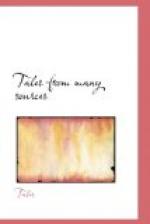Since the quickly-reached medical decision that he was in a rapid decline, and that nothing could be done for him, M’Alister had been left a good deal alone. His intellect (and it was no fool’s intellect,) was quite clear, and if the long hours by himself, in which he reckoned with his own soul, had hastened the death-damps on his brow, they had also written there an expression which was new to John Broom. It was not the old sour look, it was a kind of noble gravity.
His light-blue eyes brightened as the boy came in, and he held out his hand, and John Broom took it with both his, saying.
“I never heard till this minute, M’Alister. Eh, I do hope you’ll be better soon.”
“The Lord being merciful to me,” said the Highlander. “But this warld’s nearly past, laddie, and I was fain to see ye again. Dinna greet, man, for I’ve important business wi’ ye, and I should wish your attention. Firstly, I’m aboot to hand ower to ye the key of your box. Tak it, and put it in a pocket that’s no got a hole in it, if you’re worth one. Secondly, there’s a bit bag I made mysel’, and it’s got a trifle o’ money in it that I’m giving and bequeathing to ye, under certain conditions, namely, that ye shall spend the contents of the box according to my last wishes and instructions, with the ultimate end of your ain benefit, ye’ll understand.”
A fit of coughing here broke M’Alister’s discourse; but, after drinking from a cup beside him, he put aside John Broom’s remonstrances with a dignified movement of his hand, and continued,—
“When a body comes of decent folks, he won’t just care, maybe, to have their names brought up in a barrack-room. Ye never heard me say ought of my father or my mither?”
“Never, M’Alister.”
“I’d a good hame,” said the Highlander, with a decent pride in his tone. “It was a strict hame—I’ve no cause now, to deceive mysel’, and I’m thinking it was a wee bit ower strict—but it was a good hame. I left it, man—I ran away.”
The glittering blue eyes turned sharply on the lad, and he went on:—
“A body doesna care to turn his byeganes oot for every fool to pick at. Did I ever speer about your past life, and whar ye came from?”
“Never, M’Alister.”
“But that’s no to say that, if I knew manners, I didna obsairve. And there’s been things now and again, John Broom, that’s gar’d me think that ye’ve had what I had, and done as I did. Did ye rin awa’, laddie?”
John Broom nodded his black head, but tears choked his voice.
“Man!” said the Highlander, “ane word’s as gude’s a thousand. Gang back! Gang hame! There’s the bit siller here that’s to tak ye, and the love yonder that’s waiting ye. Listen to a dying man, laddie, and gang hame!”
“I doubt if they’d have me,” sobbed John Broom, “I gave ’em a deal of trouble, M’Alister.”
“And d’ye think, lad, that that thought has na’ cursed me, and keepit me from them that loved me? Aye, lad, and till this week I never overcame it.”




